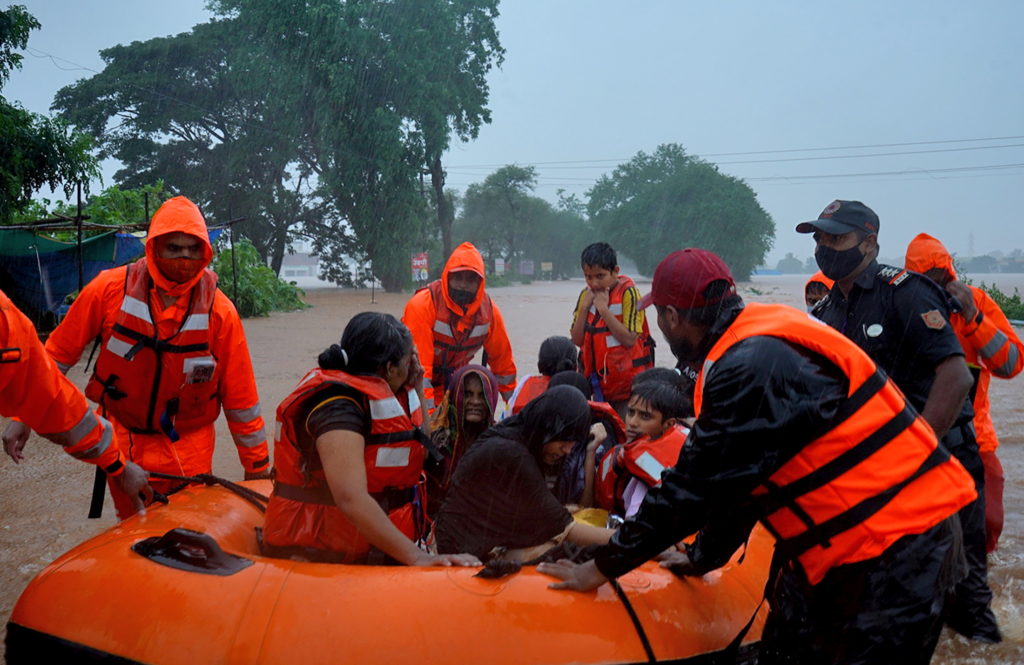NEW DELHI (AP) — Landslides and flooding triggered by heavy monsoon rain hit parts of western India, killing more than 100 people, officials and news reports said Friday.
More than 1,000 people trapped by floodwaters were rescued.
The dead included 54 killed in four landslides in the Raigad and Ratnagiri districts in western Maharashtra state on Thursday and Friday, according to District Collector Nidhi Chaudhary and state government official Sagar Pathak.
Many of those who were rescued were stranded on rooftops and even on top of buses on highways, Chaudhary said.
Pathak said more than 30 people were missing after the landslides.
Chaudhary said the rain had slowed, but water levels were rising again because of a high tide Friday. Rescuers, however, have reached the worst-hit areas.
Disasters caused by landslides and flooding are common in India during the June-September monsoon season, when heavy rains weaken the foundations of structures that are often poorly built.
Twenty-seven people were killed by houses collapsing or being swept away by rushing floodwaters in Satara district, the Press Trust of India news agency reported. It also said more than 20 deaths have been reported from the eastern districts of Gondia and Chandrapur.
Prime Minister Narendra Modi said he was anguished by the loss of lives.
“The situation in Maharashtra due to heavy rains is being closely monitored and assistance is being provided to the affected,” Modi tweeted.
Elsewhere, a house collapsed Friday after heavy rains in the Shivaji Nagar area in eastern Mumbai, killing at least four two people and injuring eight others, fire officials said.
In Ratnagiri district, 200 people were rescued from hilly areas on Thursday after the heavy rains. In the coastal town of Chiplun, home to 70,000 people, more than half the area was flooded, said B.N. Patil, district administrator of Ratnagiri.
The army, navy, coast guard and the National Disaster Response Force were helping in rescue operations, the defense ministry said.
An Indian navy statement said it deployed helicopters to evacuate stranded people and sent rescue teams with boats to the region.
Authorities on Friday sounded an alert in the southern state of Telangana, with heavy rains causing flooding in Hyderabad, the state capital, and other low-lying areas.
Meteorologists said the 30 centimeters (12 inches) of rain that has fallen so far this month in Hyderabad, one of India’s information technology hubs, is the most in July in 10 years. The floodgates of one of the main reservoirs, Osman Sagar, were opened for the first time in a decade to discharge excess water.
Last weekend, more than 30 people were killed in landslides triggered by heavy monsoon rain in and around Mumbai, India’s financial and entertainment capital.
The monsoon is crucial for rain-fed crops planted during the season, but the rain often causes extensive damage and kills scores of people each year.
Experts said heavy rainfall along India’s western coast is in line with how rainfall patterns have changed in the region in past years due to climate change.
“The frequency and intensity of heavy rains has increased,” said Roxy Mathew Koll, a scientist at the Indian Institute of Tropical Meteorology in the western city of Pune.
He added that the warming Arabian Sea is driving more cyclones and more intense rainfall over short periods of time.
“Every year we need to be prepared on the west coast,” he said.
Associated Press writers Omer Farooq in Hyderabad, India, and Aniruddha Ghosal in New Delhi contributed to this report.













































